Your immune system is a network of cells, tissues and organs that defend your body, by generating antibodies against foreign particles and invaders, like bacterias and parasites that are most likely to get you sick.[1]
Immunity plays a vital role for you to stay healthy; let’s understand how:
It Protects You
The immune system is the foundation of preventing and helping you recover from infections, although you may at times require medical help. When a virus enters your body, it is your immunity that targets the virus to kill it.
Stress Affects It
The more confident and relaxed your body is, the more unlikely you are to fall sick. Stress affects your immunity and hampers its effectiveness.
It’s A Network
Your immune system includes your tonsils, digestive system, bone marrow, skin, lymph nodes, spleen and the thin skin inside your nose, throat and genitals. They all work to keep you healthy.
Immunity Develops As You Age
Babies are born with a certain level of immunity which gets better as they grow. They take antibodies from their mother’s on being breastfed. Also, as and when they are exposed to illnesses, their body starts developing a bank of antibodies to fight off future invaders.
Additionally, vaccines help in building immunity in kids. A vaccine basically exposes the body to a tiny amount of the virus that is either dead or weakened. Your immune system generates antibodies in response and ends up storing the same.[2]
But It Also Starts Declining After A Certain Age
The immune function weakens as you grow older. Older adults struggle with the rate at which B and T cells are produced and the maturity of the lymphocyte pool[3]. B & T cells are basically lymphocytes that identify the foreign particles in your body to ensure the immune system does not attack your own body. While elders are not immunodeficient, their bodies fail to respond efficiently to previously fought antigens.[4]
What Factors Affect Immunity?
The factors that affect immunity are :
Sleep
One of the main reasons our immunity dwindles as we grow old is because of our sleep cycle. Lack of sleep makes you more prone to viruses and infections because your body releases a protein called cytokine that helps the immune system in fighting illnesses only during sleep.[5]
Medications
Certain medications adversely affect your immunity. Drugs for allergies, arthritis, lupus, IBS, and organ transplant may reduce your immunity.
Reduced Intake of Fruits & Vegetables & excess fat intake
Fresh fruit and vegetables help in creating white blood cells that are the first to respond to infections. They are rich in zinc, Vitamins A, C & E and are full of nutrients required for a healthy body. Vegetables also help in lowering your fat percentage, which improves your immune response.
However, as adults, we often resort to quick & fatty foods to satiate hunger. What happens is that oils hinder the white blood cells. Thus, excess fats and reduced consumption of vegetables and fruits impact your immunity.
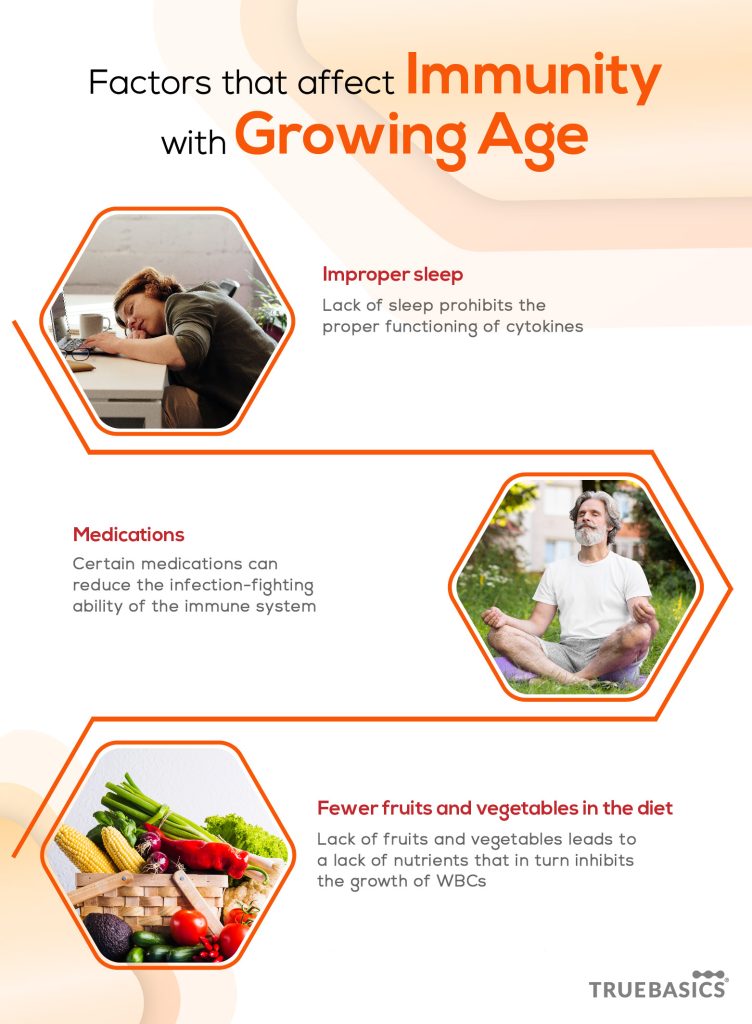
Little time outdoors
Vitamin D is vital for boosting immunity. Found in eggs and fortified food, Vitamin D is also abundantly found in sunlight that your body absorbs when outdoors. Sunlight also energises T cells in your body.
Nicotine & Alcohol
Nicotine in any form suppresses your immune system response. Smoking, vaping, e-liquids all damage your immunity. Alcohol, on the other hand, slows down the ability of your body to fight germs and repair itself.
Age
As stated previously, the generation of B & T cells is robust in youth, while the process is affected in elderly people. Several other systematic changes in elders impacts the production of lymphocytes, which are key in fighting infections.
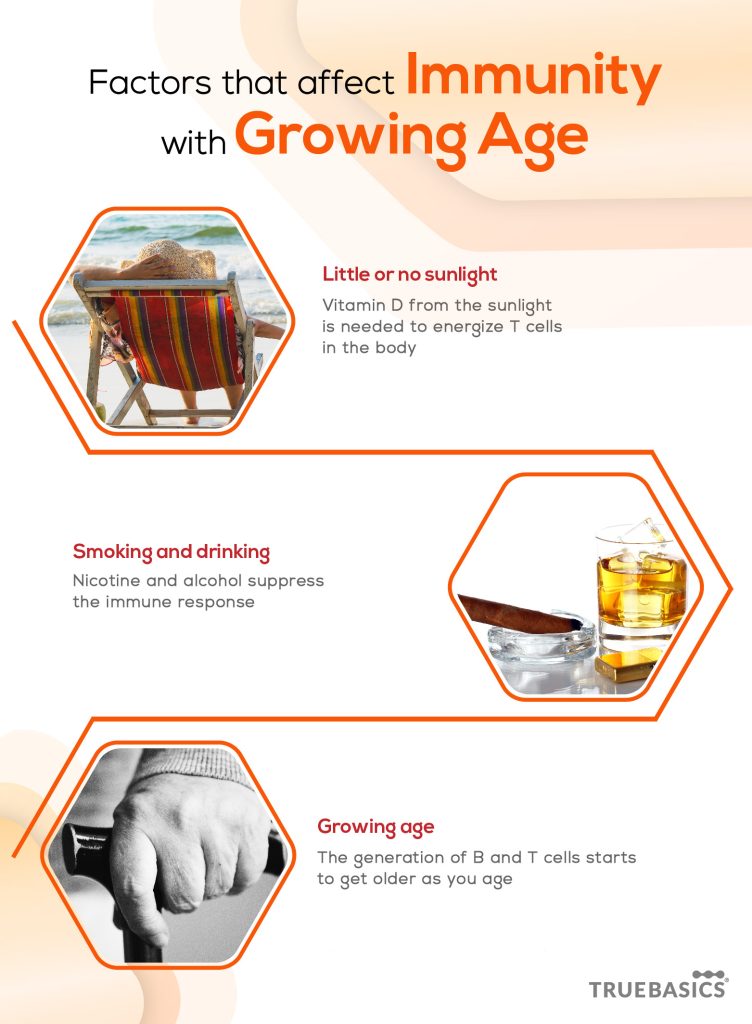
Different Immunity Across Demographics
As per a study conducted by the University of Melbourne, there is a significant difference between male and female immune systems. The main reasons being the sex hormones, testosterone & estradiol. Younger females have stronger immunity as compared to younger males and older females and males.
Women Aged 18 to 50 Years
A study conducted by John Hopkins University Bloomberg School of Public Health, the immune responses on young women to flu vaccines, was way stronger than men in general and older women. This can be attributed to the high levels of estradiol, one of the important estrogens. Young women produce greater antibodies, have a stronger inflammatory response and greater levels of cytokine, thus contributing to a stronger immune system.[6]
Women Aged 50 years & above
The immune responses which are directly affected by the levels of estradiol, reduces with age in women, as menopause causes a drop in estradiol[7]. Although women have a robust immune system to infections, as women age, they become more prone to autoimmune diseases due to the hyper immunity[8]. Their adaptive immune system improves, while their innate immune responses reduce.
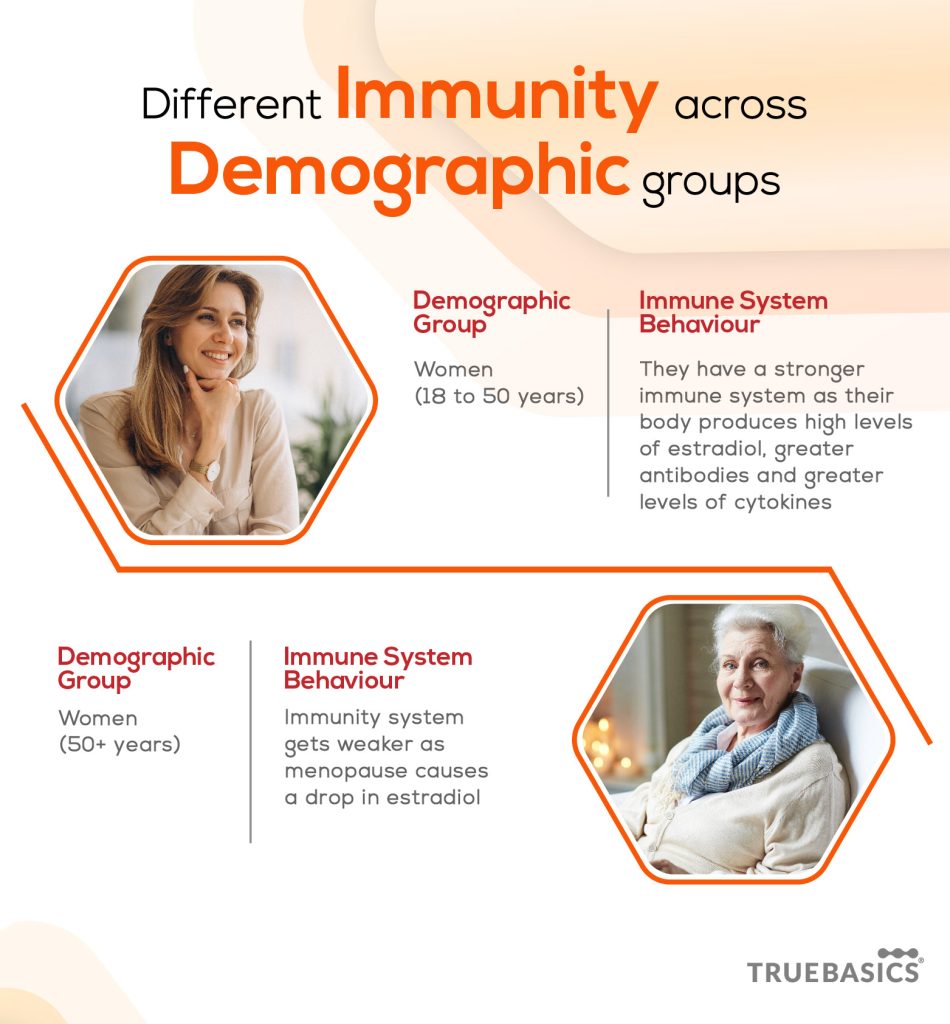
Men Aged 18-50 Years
The study found out that the immune responses of younger males to the flu vaccine were one-third of that of the younger female response. The weak immune response is due to the high levels of testosterone found in younger males.[9]
Men Aged 50 Years & above
Older men develop a higher natural immune response due to lower levels of testosterone. However, their adaptive immunity is low. Thus, their response to infections remains poor[10]. Thus, men are more likely to catch metabolism-related issues like diabetes and obesity.

How To Strengthen Immunity With Growing Age?
Diet
A healthy diet that supplies you tons of nutrients is essential for a good immune system. Empty calories not only increase your weight, which in turn makes you more susceptible to diseases, but also adversely affect your immune responses. A diet rich in antioxidant vitamins adds to your immunity. Citrus fruits, apples, onions, sweet potatoes, spinach and carrots are good for the immune system. Fresh garlic also has antibiotic properties. Mushrooms too improve your immune function. As you grow older, it’s important to incorporate healthy food in your diet and avoid fatty and sugary foods.[11]
Avoiding Contact With Sick People
There is no doubt that your overall immunity drops as you grow older, whether you are a male or a female. Staying away from germ exposure is essential to protect your health. It’s better to avoid meeting people who are already ill with contagious diseases.[12]
Sleep Well
The best way to improve your immunity irrespective of gender & age is a healthy diet and a good sleep cycle. Sleep is necessary for a functioning immune system as it facilitates the generation of the cytokine protein.
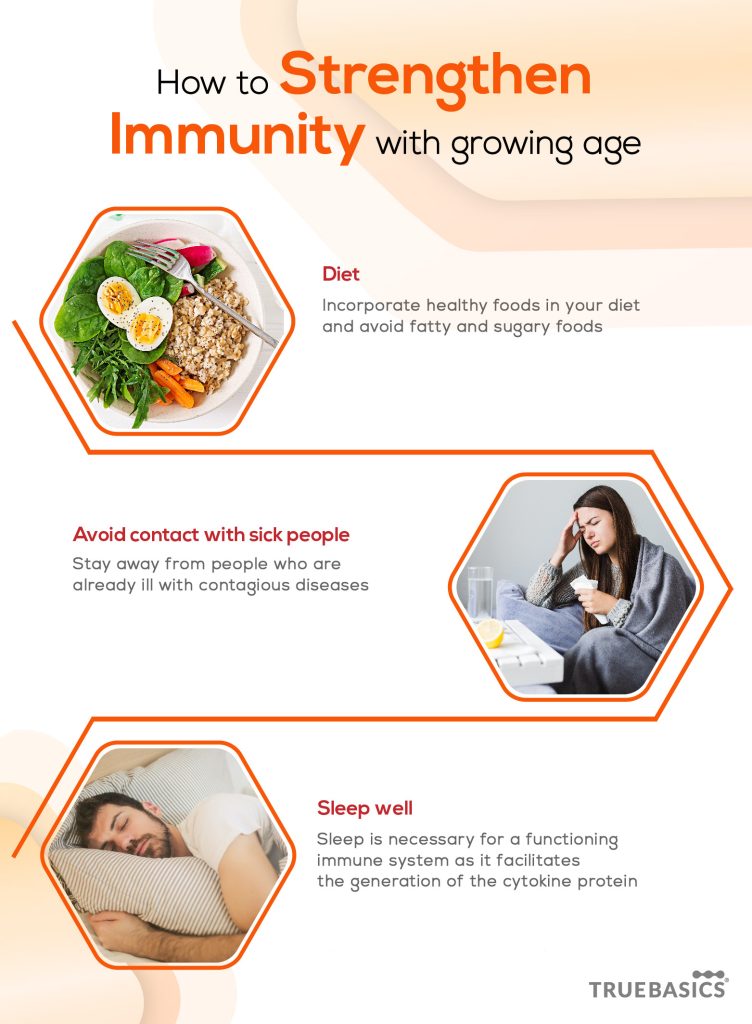
Manage Your Stress Levels
Stress is a known contributor to weakened immunity. With old age comes different forms of stress, and it is essential to make sure you don’t let the stress get to you.
Vaccines
Although vaccines may not be as effective as they were when you were younger, do not skip your vaccinations as they protect you from several diseases.[13]
Exercise
Exercise and physical activity help your body in generating white blood cells which are vital to fighting diseases. It also flushes out bacteria and reduces your chances of getting any flu. Make exercise a part of your routine.
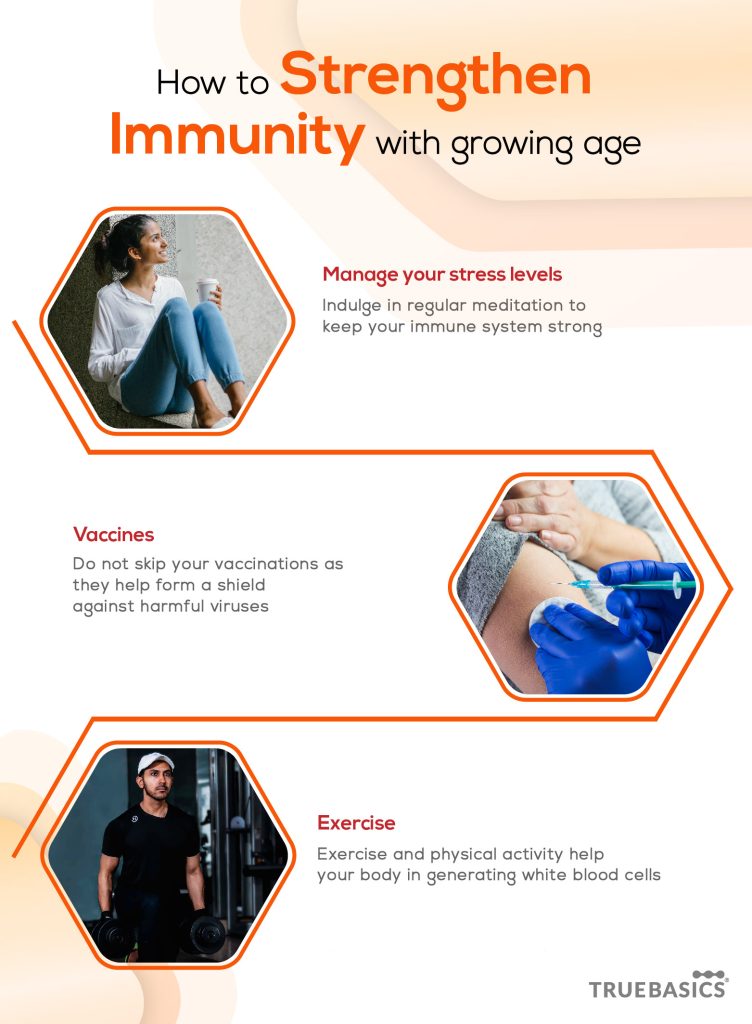
Conclusion
Your age & gender impacts your immune responses, and maintaining a healthy immunity is vital. You cannot compromise on your immune system as it protects you against anything and everything. Make the essential changes in your diet and lifestyle to keep your immunity up to the mark.
Sources :
[1]https://www.webmd.com/a-to-z-guides/features/how-use-your-immune-system-stay-healthy#:~:text=The%20immune%20system%20is%20your,potential%20to%20make%20us%20sick.
[2]https://www.webmd.com/cold-and-flu/immune-system-function
[3]https://www.ncbi.nlm.nih.gov/pmc/articles/PMC3582124/#!po=2.11864
[4]https://bio.libretexts.org/Bookshelves/Microbiology/Book%3A_Microbiology_(Boundless)/11%3A_Immunology/11.03%3A_Phagocytes/11.4B%3A__Antigen-presenting_Cells_-_B_and_T_cells
[5]https://www.webmd.com/cold-and-flu/ss/slideshow-how-you-suppress-immune-system
[6]https://www.sciencedaily.com/releases/2019/07/190716124851.htm
[7]https://www.sciencedaily.com/releases/2019/07/190716124851.htm
[8]https://www.google.com/amp/s/www.news-medical.net/amp/health/Does-the-Immune-System-Differ-between-Men-and-Women.aspx
[9] https://www.sciencedaily.com/releases/2019/07/190716124851.htm
[10]https://www.jax.org/news-and-insights/2020/february/immune-system-changes-with-age-differ-between-men-and-women#:~:text=They%20found%20significant%20differences%20in,indicating%20less%20robust%20infection%20response
[11]https://www.webmd.com/a-to-z-guides/features/how-use-your-immune-system-stay-healthy#:~:text=The%20immune%20system%20is%20your,potential%20to%20make%20us%20sick.
[12]https://www.webmd.com/healthy-aging/guide/seniors-boost-immunity
[13]https://www.webmd.com/healthy-aging/guide/seniors-boost-immunity













